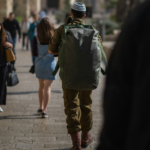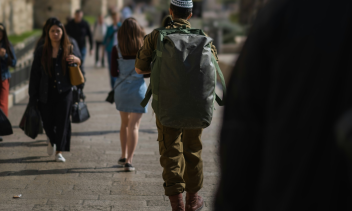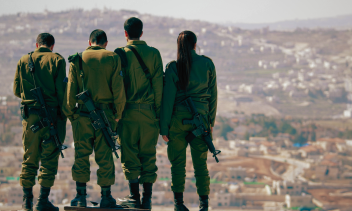I’ve never really written in after listening to a podcast or anything of that sort, but because of what 18Forty means to me— especially in my journey from yeshiva, to the army, back to yeshiva, and now back to the army (since the war broke out)— I felt I had to get in touch.
Since I crossed Gaza’s border last week (after nearly seven weeks stationed there), I have not yet listened to all of 18Forty’s podcasts on “Israel at War,” but I have listened to Eli Paley’s conversation on Israel’s Charedi community and the “army problem.” While I respect his work in moving the Charedi community forward, I think his approach fails to stress how essential army service is to Am Yisrael.

I made aliyah from England halfway through my time at Yeshiva Hakotel, and since then—and I don’t mean to sound patronizing—I have increasingly felt that our many misunderstanding of Jewish nationhood is incomplete. Having sovereignty and control over our land—what we call nationalism in the political sphere—is not a “nicety” that simply keeps us safe, rather it is a fundamental component of Am Yisrael, the Jewish nation, and the fulfillment of our roles as the Am Ha-Nivchar and Ohr La-Goyim (chosen nation and light for the nations).
As someone with an undying love of halacha and talmud Torah (I plan to return to yeshiva after the war), who also completed a 29-month army service, I strongly believe those exclusively learning in the beit midrash would have a significantly richer Judaism had they served in the army. My love for Am Yisrael and Eretz Yisrael, bred in my service, epitomizes the classic religious expression “I am lovesick” (Shir Ha-Shirim 2:5).
I’m talking about the pain of 14-month training; the trial for entrance into the Paratroopers Brigade, followed by a second trial for entrance into the brigade’s sayeret (reconnaissance battalion); the Tanakh chapters studied in bushes up north; the sweat caked into my tefillin and tzizit; the struggle to pray for rain as I shiver in clothes soaked wet for 36-hours straight; the difficulty to read my siddur despite my shivering hand; the days when RPGs are shot at my plugah (company) and I say, with absolute certainty, if my death is a price this cause demands, it’s worth the payment; the confusion of Shabbos in wartime; the comforting guidance of halacha; the love for my comrade who eats on Yom Kippur because I understand that he is my brother and I love him more than I can explain; the frustration of 2000 years stagnant in exile, unable to return home; and the jubilation of re-establishing a Jewish government and setting the groundwork for the return of the Messianic age.
And all this is matched with the embarrassment of the question facing us: Where were we, Torah-observant Jews, when the Jewish state was being born? How could our heads have been so deeply buried in Rashi and Tosfot that we overlooked the greatness of the secular Zionists’ work? And what does that say about our Torah learning?
I know that I will regret not providing more examples, but what I’m trying to say is this: Yes, the Israeli army needs Jews to draft, but more than that, Jews need to experience what it means to serve.
I understand where communities in Chutz La-Aretz are confused: why Israelis talk about Rav Kook over Rav Soloveitchik, why Israeli communities that look “yeshivish” are ideologically different than American versions, and why Israeli values are emphasized so differently here. But if people could just dip their toes into this ever-rich sea of Judaism in Eretz Yisrael, that it extends beyond Torah learning and mitzvah observance—by elevating them, not dismissing them—I think they would be blown away. Judaism in Israel speaks to living as a Jew in the world and opens spiritual doors locked for millennia.
אַחַת שָׁאַלְתִּי מֵאֵת־ה’ אוֹתָהּ אֲבַקֵּשׁ שִׁבְתִּי בְּבֵית־ה’ כָּל־יְמֵי חַיַּי
One thing I ask of You, Hashem; this, I seek: sitting in Your home all the days of my life (Tehillim 27:4)
Just like David Hamelech, I, too, sometimes wish that I could sit in the beit midrash all day, immersed in a world of Torah learning. But we have political and military obligations demanding our attention. What I’m saying is that the Israeli army is also God’s home—and it’s an ideal we strive for, not a reality we simply submit to.








